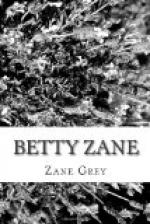The word was given, and stripped to the waist, Isaac bounded forward fleet as a deer. He knew the Indian way of running the gauntlet. The head of that long lane contained the warriors and older braves and it was here that the great danger lay. Between these lines he sped like a flash, dodging this way and that, running close in under the raised weapons, taking what blows he could on his uplifted arms, knocking this warrior over and doubling that one up with a lightning blow in the stomach, never slacking his speed for one stride, so that it was extremely difficult for the Indians to strike him effectually. Once past that formidable array, Isaac’s gauntlet was run, for the squaws and children scattered screaming before the sweep of his powerful arms.
The old chiefs grunted their approval. There was a bruise on Isaac’s forehead and a few drops of blood mingled with the beads of perspiration. Several lumps and scratches showed on his bare shoulders and arms, but he had escaped any serious injury. This was a feat almost without a parallel in gauntlet running.
When he had been tied with wet buckskin thongs to the post in the center of the oval, the youths, the younger braves, and the squaws began circling round him, yelling like so many demons. The old squaws thrust sharpened sticks, which had been soaked in salt water, into his flesh. The maidens struck him with willows which left red welts on his white shoulders. The braves buried the blades of their tomahawks in the post as near as possible to his head without actually hitting him.
Isaac knew the Indian nature well. To command the respect of the savages was the only way to lessen his torture. He knew that a cry for mercy would only increase his sufferings and not hasten his death,—indeed it would prolong both. He had resolved to die without a moan. He had determined to show absolute indifference to his torture, which was the only way to appeal to the savage nature, and if anything could, make the Indians show mercy. Or, if he could taunt them into killing him at once he would be spared all the terrible agony which they were in the habit of inflicting on their victims.
One handsome young brave twirled a glittering tomahawk which he threw from a distance of ten, fifteen, and twenty feet and every time the sharp blade of the hatchet sank deep into the stake within an inch of Isaac’s head. With a proud and disdainful look Isaac gazed straight before him and paid no heed to his tormentor.
“Does the Indian boy think he can frighten a white warrior?” said Isaac scornfully at length. “Let him go and earn his eagle plumes. The pale face laughs at him.”
The young brave understood the Huron language, for he gave a frightful yell and cast his tomahawk again, this time shaving a lock of hair from Isaac’s head.
This was what Isaac had prayed for. He hoped that one of these glittering hatchets would be propelled less skillfully than its predecessors and would kill him instantly. But the enraged brave had no other opportunity to cast his weapon, for the Indians jeered at him and pushed him from the line.




